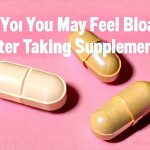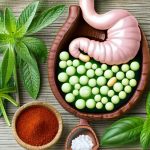The world of herbal supplements is vast and increasingly popular, promising everything from enhanced immunity to improved sleep. Many people turn to these natural remedies seeking alternatives to conventional medicine, or as complementary therapies alongside their existing healthcare routines. However, the experience isn’t always smooth sailing. A surprisingly common complaint among those using herbal supplements is bloating – that uncomfortable feeling of fullness, gas, and abdominal distension. It’s a frustrating side effect that can negate the intended benefits of the supplement, leaving people wondering what went wrong and whether natural doesn’t necessarily mean problem-free.
Bloating from herbal supplements isn’t always straightforward. Unlike reactions to food allergies which are often rapid and obvious, the causes behind bloating induced by herbs can be complex, ranging from individual sensitivities to the inherent properties of certain plants themselves. It’s crucial to understand that “natural” doesn’t automatically equate to “gentle on the digestive system.” Many potent herbal remedies contain compounds that actively stimulate digestion or have strong physiological effects; these effects, while beneficial for some, can lead to uncomfortable side effects in others. This article will delve into the reasons why some herbal supplements might leave you feeling bloated, exploring both the inherent properties of herbs and individual factors that contribute to this common issue.
Understanding Herbal Properties & Digestive Impact
Many herbs exert their therapeutic effects by influencing digestive processes. Some are designed to stimulate digestion – think carminatives like ginger or peppermint which help relieve gas and cramping, but can also increase gut motility. Others, like psyllium husk (often used for regularity), work by adding bulk to the stool, requiring more water intake to prevent constipation and potential bloating if not adequately hydrated. The very mechanisms that make these herbs effective are often what contribute to bloating in sensitive individuals. For example, a herb intended to ‘cleanse’ the digestive system may inadvertently disrupt the natural gut flora, leading to temporary imbalances and discomfort.
It’s important to remember that herbal supplements aren’t subject to the same rigorous testing as pharmaceutical drugs. This means variations in potency and purity can occur between different brands or even batches of the same product. A higher concentration of active compounds – or the presence of contaminants – could exacerbate digestive issues. Furthermore, many herbs contain complex chemical compositions; it’s not always just one single ‘active ingredient’ that produces an effect, but a combination of compounds interacting with each other and the body. This complexity makes predicting individual responses more challenging.
Finally, the form in which you take the supplement matters. Capsules, tablets, powders, teas – each method impacts how quickly the herb is absorbed and interacts with your digestive system. Powders mixed with liquid are generally faster acting but can sometimes cause quicker, more intense reactions; capsules might offer slower release but could still contribute to bloating if not well-tolerated.
Identifying Common Culprits
Certain herbal supplements are more frequently associated with bloating than others. Here’s a look at some of the most common offenders and why they might cause discomfort:
- Fiber-Rich Supplements: Psyllium husk, flaxseed, and chia seed are all excellent sources of fiber but can induce bloating if not taken with sufficient water or if you’re not accustomed to a high-fiber diet. The fermentation of undigested fiber by gut bacteria produces gas as a byproduct.
- Magnesium Supplements: While magnesium is essential for many bodily functions, certain forms (like magnesium oxide) have a strong laxative effect and can draw water into the intestines, leading to bloating and diarrhea. Magnesium citrate is generally better tolerated but can still cause issues in sensitive individuals.
- Probiotic Supplements: Ironically, even probiotics – designed to improve gut health – can sometimes cause temporary bloating as the bacterial populations shift within your digestive system. This is more common when starting a new probiotic regimen or using a high-potency formula.
- Licorice Root: Often used for adrenal support and digestive issues, licorice root contains glycyrrhizinic acid which can cause water retention and electrolyte imbalances, leading to bloating and potentially elevated blood pressure in some individuals.
- Fennel & Anise: These carminative herbs are often recommended for gas relief but can paradoxically cause bloating in some due to their ability to relax the digestive muscles.
The Role of Individual Sensitivities & Gut Health
Everyone’s digestive system is unique, and what works well for one person might cause problems for another. Pre-existing conditions like Irritable Bowel Syndrome (IBS), Small Intestinal Bacterial Overgrowth (SIBO), or food intolerances can significantly increase your susceptibility to bloating from herbal supplements. If you have a compromised gut microbiome – perhaps due to antibiotic use, chronic stress, or poor diet – you may be more sensitive to changes induced by herbs.
- Histamine intolerance is also becoming increasingly recognized as a potential contributor. Certain herbs (like dandelion root) can release histamine in the body, triggering symptoms like bloating, headaches, and skin rashes in those with histamine sensitivity.
- Genetic predispositions play a role too; some people are naturally less efficient at digesting certain types of carbohydrates or fibers found in herbal supplements. If you ever eat everything and feel fine, it might be a sign your digestive system is resilient!
Minimizing Bloat & Finding Relief
If you suspect an herbal supplement is causing bloating, here are some steps you can take:
- Hydrate Adequately: This is especially important with fiber-rich supplements. Drink plenty of water throughout the day to help move things along and prevent constipation.
- Start Low & Go Slow: Begin with a lower dose than recommended on the label, and gradually increase it only if you tolerate it well.
- Timing Matters: Take supplements with meals if they are known to cause digestive upset. This can help buffer their effects.
- Evaluate Your Gut Health: Consider consulting with a healthcare professional to assess your gut microbiome and identify any underlying imbalances or sensitivities. A food elimination diet, under guidance, might help pinpoint triggers.
- Review Supplement Interactions: Be mindful of combining supplements. Some combinations could worsen bloating or interfere with absorption. For instance, taking magnesium alongside a fiber supplement may amplify the laxative effect.
- Consider Different Forms: If capsules are causing issues, try a different form – like a tea (if appropriate for the herb) or a powder mixed with liquid.
Ultimately, navigating the world of herbal supplements requires awareness and self-observation. Paying attention to your body’s signals and adjusting your approach accordingly is essential for reaping the benefits without experiencing unwanted side effects like bloating. Remember that seeking guidance from a qualified healthcare professional – such as a registered dietitian or herbalist – can provide personalized advice tailored to your specific needs and health status. Sometimes, feeling like something is stuck isn’t just about the food you ate; it could be a reaction to supplements! If you experience frequent bloating, especially after meals, you may want to investigate if GERD is contributing. Don’t forget that even seemingly harmless herbs could be causing digestive side effects. And remember, dietary choices are important too – explore low-acid salad dressings to support your digestive health. Finally, consider that bloating could be more common in children; if this is the case for your little one, you may want to learn why some kids are always bloated.


















